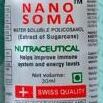Transforming Industries: The Role of Nanoemulsions in Long-Chain Alcohol Applications
Introduction
In recent years, the emergence of nanotechnology has revolutionized various industrial sectors, from pharmaceuticals to agriculture. Among the many groundbreaking innovations in this field, nanoemulsions have gained significant attention due to their ability to enhance the solubility, stability, and bioavailability of hydrophobic compounds. One such application of nanoemulsions that is garnering interest is the incorporation of long-chain alcohols. These versatile compounds find utility in food, cosmetics, pharmaceuticals, and industrial applications. By transforming the way long-chain alcohols are used, nanoemulsions are paving the path towards more efficient processes and improved product formulations.
Understanding Nanoemulsions
Nanoemulsions are thermodynamically stable, transparent mixtures of two immiscible liquids, such as oil and water, stabilized by surfactants and reduced to droplet sizes ranging from 20 to 200 nanometers. Their unique properties, such as increased surface area and enhanced permeability, allow for better dispersion and absorption of substances.
In the context of long-chain alcohols, nanoemulsions can aid in overcoming several challenges associated with their formulation, including low solubility and stability. Long-chain alcohols—such as cetyl alcohol, stearyl alcohol, and oleyl alcohol—typically exhibit hydrophobic characteristics that can limit their effectiveness in various applications. However, when incorporated into nanoemulsions, these alcohols can be better dispersed, leading to enhanced performance across different industries.
Applications Across Industries
-
Pharmaceuticals:
Long-chain alcohols are often used in drug formulation as emulsifiers or stabilizers. Nanoemulsions allow for controlled release and improved bioavailability of hydrophobic drugs. For instance, utilizing cetyl alcohol in nanoemulsions can enhance the delivery of poorly soluble medications, ultimately improving therapeutic outcomes and patient compliance. The high surface area of nanoemulsions ensures better interaction with biological membranes, promoting efficient drug absorption. -
Cosmetics and Personal Care:
The cosmetics industry benefits greatly from the application of nanoemulsions. Long-chain alcohols serve as emollients and emulsifiers in creams, lotions, and serums. By employing nanoemulsion technology, formulators can create lightweight and fast-absorbing products that provide lasting hydration without a greasy feel. For example, stearyl alcohol in nanoemulsions can help stabilize high-water content formulations, leading to enhanced sensory attributes and improved product effectiveness. -
Food and Beverage:
In the food industry, long-chain alcohols are used as flavoring agents and emulsifiers. The use of nanoemulsions in food formulations can improve taste delivery and stability, leading to an enhanced sensory experience. Moreover, nanoemulsions can help incorporate oils and flavors in low-fat products, thus catering to a growing demand for healthier food alternatives without compromising on taste. - Agriculture:
Long-chain alcohols can be utilized in agrochemical formulations, acting as surfactants that enhance the efficacy of pesticides and herbicides. Nanoemulsions can increase the spreadability and penetration of these chemicals, leading to improved effectiveness at lower application rates. Their ability to reduce the environmental impact of agrochemicals while maintaining efficacy underscores the transformative potential of nanoemulsions in sustainable agriculture.
Challenges and Future Directions
Despite the promising applications of nanoemulsions in long-chain alcohol formulations, several challenges persist. The production of nanoemulsions requires precise control of various parameters, including surfactant choice, mixing conditions, and formulation stability. Additionally, regulatory considerations surrounding nanotechnology must be addressed to ensure consumer safety and compliance.
Looking ahead, ongoing research in characterizing and optimizing nanoemulsion formulations will further unlock the potential of long-chain alcohols across industries. Innovations in surfactant development, production methodologies, and safety assessments will pave the way for more widespread adoption.
Conclusion
The integration of nanoemulsions with long-chain alcohols represents a vital shift in industrial applications, driving advancements in pharmaceuticals, cosmetics, food, and agriculture. By enhancing solubility, stability, and bioavailability, nanoemulsions are not only improving product performance but also contributing to more sustainable practices. As research and technology continue to evolve, the transformative potential of nanoemulsions is poised to reshape industry standards, leading to more efficient and effective product formulations.
